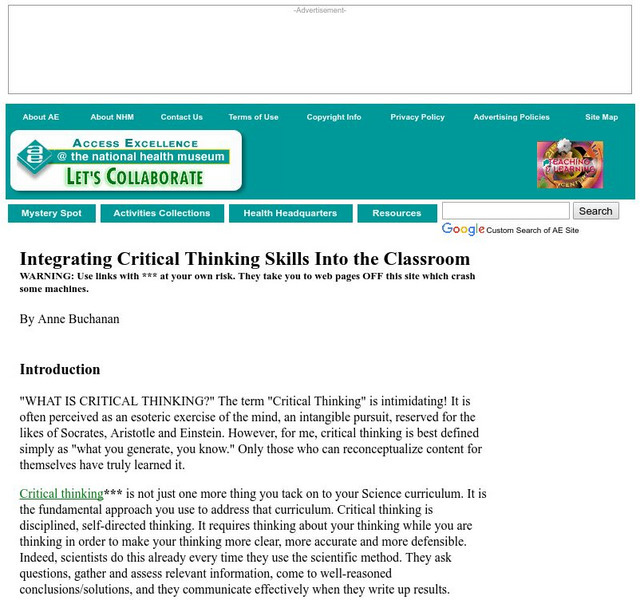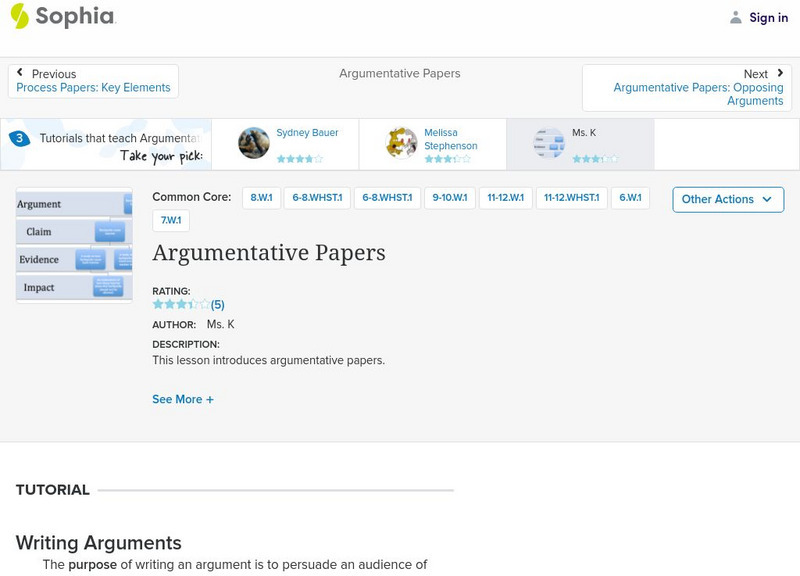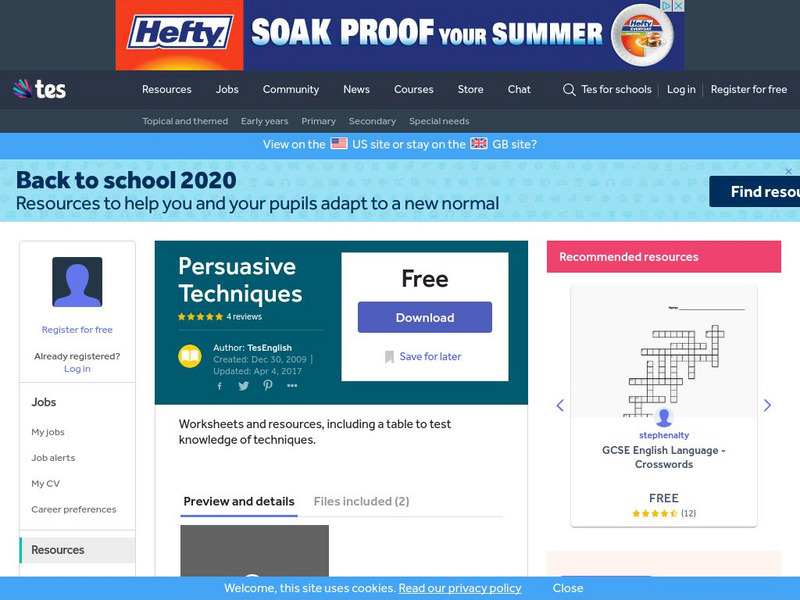Hi, what do you want to do?
Polk Brothers Foundation Center for Urban Education at DePaul University
Depaul University: Center for Urban Education: Classify Facts and Opinions [Pdf]
Students will find three lessons about facts and opinions in this learning module. The following topics are linked in the module: contrast and evaluate fact and opinion; classify facts and opinions; and locate and classify facts.
National Health Museum
Access Excellence: Integrating Critical Thinking Skills
This site from Access Excellence explores how, as an educator, you can incorporate critical thinking skills into the classroom. Content focuses on how to cover content so that students can grasp information, engage with the teacher, read...
Austin Independent School District
Austin Independent School District: Logical Fallacies [Pdf]
A slide show explaining different types of fallacies in persuasive texts including personal attack, bandwagon, appeal to authority, and many more. Then try to find the fallacy in several examples; answers and explanations provided.
Quia
Quia: Fact or Opinion?
This is a 30 question quiz on separating fact from opinion. Students read the statement and select fact or opinion. Java plugin is required.
iCivics
I Civics: Games: Argument Wars
Games in which players act as lawyers arguing head to head before a judge about real Supreme Court cases.
Polk Brothers Foundation Center for Urban Education at DePaul University
Depaul University: Center for Urban Education: Evaluate Support for a Claim[pdf]
This resource provides a downloadable worksheet to use after reading a nonfiction text. Students will evaluate an author's support for a claim by answering the questions and prompts provided on the worksheet.
University of Illinois
University of Illinois Extension: Is It What I Think or What I Know? (Fact or Opinion)
This short lesson provides a fairly simple way to teach young students the difference between fact and opinion.
E Reading Worksheets
E Reading Worksheets: Fact and Opinion Lessons
In this learning module, students will learn more about the differences between facts and opinions. A PowerPoint presentation and related activity are provided to reinforce the topic of facts vs. opinions. This module is designed to...
Sophia Learning
Sophia: Argumentative Papers: Lesson 1
This lesson introduces argumentative papers. It is 1 of 3 in the series titled "Argumentative Papers."
Other
Flickr: Critical Thinking Skills Poster
A downloadable critical thinking skills poster based on the original six levels of Bloom's taxonomy.
Other
Six Minutes: Speech Analysis #1: How to Study and Critique a Speech
Dlugen presents a detailed collection of tips to observe when critiquing others' speeches. This skill is critical in improving individual presentation abilities. SL.9-10.3 Eval Presentation. CCSS.ELA-Literacy.CCRA.SL.3, SL.9-10.3 Eval...
TES Global
Tes: Persuasive Techniques
[Free Registration/Login Required] A graphic organizer is provided to help students analyze persuasuve techniques in an advertisement. Students will analyze an advertisement and apply their understanding of the content.
Biz Move
Biz Move: How to Be a Better Listener
Article on the importance of listening in the business setting. Explains what listening is, gives guidelines, and lists barriers.
Biz Move
Biz Move: Master Your Non Verbal Communication Skills
This article dicusses many aspects of nonverbal communication - eye contact, facial expressions, distance, paralanguage, and more. This is a very good introduction to the subject.
Grammarly
Grammarly Blog: Qualifiers and Quantifiers
An explanation and examples of how qualifiers and quantifiers are used in sentences. Links to additional information are provided.
Sophia Learning
Sophia: Supporting Details: Facts and Statistics
This lesson discusses how statistics can be used as supporting details. This tutorial shares a short audio lesson [05:16] and supplemental notes with the lesson's content.
Sophia Learning
Sophia: Bias
Notes introducing bias and demonstrating how to identify slight, moderate, and strong bias in a text. Notes can be both read and listened to.
Other
Critical Thinking: Basic Questions & Answers
An interesting interview with Richard Paul discussing what critical thinking means. There are many insights as to what critical thinking involves and how it should be used in the classroom.
Other
Becoming a Critic of Your Thinking
This resource presents an article that explains why it is important to be someone who is a good thinker. Provided are four strategies for critical thinking.
Georgia Department of Education
Ga Virtual Learning: Informative Speech Critique Sheet (Pdf)
This PDF is a critique form for evaluating informative speeches. SL.9-10.3 Eval Presentation. CCSS.ELA-LiteracySL.3, SL.9-10.3 Eval Presentation
Other
Analytic Technologies: Active Listening
Excellent article on reflective, or active, listening, a method used when trying to help the speaker deal with something. Includes a chart of choices made by the listener before giving a response.
Other
How to Analyze a Speech
An interesting approach to how to analyze a speech. Presents a rhetorical pentangle as well as a rhetorical triangle, where each of the vertices represents an item to analyze. There is also an outline of the different areas to examine in...
Sophia Learning
Sophia: Elements of an Effective Argument
Discussion focuses on understanding the three academic language objectives that make an effective argument: understand the concept of a thesis statement, the significance of writing an argument with an audience in mind, and the...
Polk Brothers Foundation Center for Urban Education at DePaul University
De Paul University: Center for Urban Education: Evaluate the Strength of Evidence [Pdf]
This resource provides a downloadable worksheet that will assist students after they read a piece of nonfiction. Students will answer guided questions to help them determine the strength of evidence used when supporting a claim....





![Depaul University: Center for Urban Education: Classify Facts and Opinions [Pdf] Unit Plan Depaul University: Center for Urban Education: Classify Facts and Opinions [Pdf] Unit Plan](https://content.lessonplanet.com/knovation/original/119988-719af6c927af61affa025c27754c7fae.jpg?1661787067)

![Austin Independent School District: Logical Fallacies [Pdf] PPT Austin Independent School District: Logical Fallacies [Pdf] PPT](https://static.lp.lexp.cloud/images/attachment_defaults/resource/large/FPO-knovation.png)
















